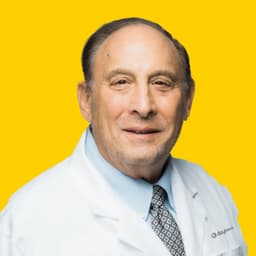Sleep Deprivation and Hunger: How Poor Sleep Disrupts Your Appetite

Dr. Martin Hopp MD, ENT
Ever notice that after a poor night’s sleep, you crave junk food the next day? You’re not alone, and there’s real science behind it. When you’re sleep-deprived, your body’s hunger hormones shift out of balance, triggering cravings for sugar, carbs, and fatty foods. Over time, this can make it harder to maintain a healthy weight, and for those who snore or suffer from obstructive sleep apnea (OSA), the problem can become an exhausting, unhealthy cycle.
Key Takeaways
- Sleep deprivation increases hunger by raising ghrelin and lowering leptin.
- Snoring and sleep apnea are major causes of poor-quality sleep that can trigger overeating.
- Untreated OSA leads to weight gain, which in turn worsens the condition, creating a harmful cycle.
- Treating sleep apnea can help restore hormonal balance, reduce cravings, improve energy, and support healthy weight management.
- Daybreak’s at-home sleep apnea test and treatment make it simple and convenient to get diagnosed and treated—without a sleep clinic or CPAP.
Sleep and Appetite: The Hormonal Link

Sleep doesn’t just recharge your mind; it also regulates your appetite. Two key hormones control your hunger cues:
- Ghrelin – the “hunger hormone” that tells you to eat.
- Leptin – the hormone that signals you’re full.
When you’re running on too little sleep, ghrelin levels rise and leptin levels drop, making you hungrier and less satisfied after eating. Add to that the fatigue and stress of being sleep-deprived, and your brain begins craving quick, high-calorie energy sources, like sugar and refined carbs.
Sleep Apnea and Hunger: How Disrupted Sleep Triggers Cravings
Snoring is more than just a nuisance; it can be a sign of sleep apnea, a condition where the airway repeatedly collapses during sleep. These pauses in breathing cause your body to jolt awake to restore airflow, often hundreds of times a night. Even if you don’t fully wake up, your sleep cycles are constantly interrupted, leading to chronic sleep deprivation.
This constant disruption throws your hunger-regulating hormones out of balance and spikes cortisol, the stress hormone. Cortisol increases your appetite and drives cravings for sugary, fatty, or salty foods. Over time, you may notice yourself eating more, gaining weight, and feeling tired no matter how much you sleep - a clear sign that your sleep quality, not your willpower, might be the real issue.
Obstructive Sleep Apnea and Weight Gain: A Harmful Cycle

Here’s how untreated sleep apnea can trap you in a harmful cycle:
- Poor sleep from OSA - increases ghrelin, decreases leptin.
- Hormone imbalance - stronger cravings for high-calorie foods.
- Overeating and weight gain - adds pressure around the airway.
- Worsened OSA - leads to even poorer sleep and deeper fatigue.
It’s a self-reinforcing loop, and without proper treatment, it can affect not just your waistline but your heart health, energy, and mood as well.
How Sleep Apnea Treatment Reduces Hunger and Sugar Cravings
Here’s the good news: when you treat sleep apnea, your body can finally rest and restore its natural hormonal balance. Patients who address their OSA often find that:
- They feel full faster and crave less junk food.
- Their energy and metabolism improve.
- Weight loss becomes easier because their appetite hormones stabilize.
Daybreak offers a complete at-home solution for diagnosing and treating sleep apnea and snoring. Our FDA-cleared, custom-made oral appliance gently repositions your jaw to keep your airway open; no bulky machines or masks required. With better sleep, you’ll not only breathe easier but also make healthier choices during the day.
Break the Cycle: Sleep Better, Eat Smarter

If you’ve been struggling with constant hunger, low energy, or unexplained weight gain, it may be time to look at your sleep quality. Treating snoring and sleep apnea can help you regain control over your appetite, your energy, and your long-term health, all while helping you finally get the deep rest your body needs.
Try Daybreak’s FDA-cleared at-home sleep test today and discover if sleep apnea is behind your cravings and fatigue.
Frequently Asked Questions About Sleep Apnea and Weight Gain

1. Is it harder to lose weight with sleep apnea?
Yes. Sleep apnea disrupts metabolism and appetite-regulating hormones, such as ghrelin and leptin. This imbalance increases hunger and cravings—especially for high-calorie foods—making it more difficult to lose weight, even with a diet and exercise regimen.
2. Why do I crave sugar when I’m tired?
When you’re sleep-deprived, your body produces more ghrelin which stimulates hunger) and cortisol (the stress hormone), while reducing leptin (which signals fullness). This combination leads to intense cravings for quick energy sources, such as sugar and refined carbohydrates.
3. Will treating sleep apnea help me lose weight?
While treatment alone isn’t a weight-loss program, restoring healthy sleep can make it easier to manage hunger, reduce cravings, and stay consistent with healthy habits.
4. How does an oral appliance help with sleep apnea?
A custom mandibular advancement device (MAD) repositions your jaw slightly forward, keeping your airway open while you sleep, reducing snoring and breathing interruptions.
5. How can I get tested for sleep apnea at home?
Daybreak offers an FDA-cleared at-home sleep test that measures your breathing patterns overnight. If sleep apnea is detected, our team can guide you through getting a custom-fitted oral appliance—all from the comfort of your home.
